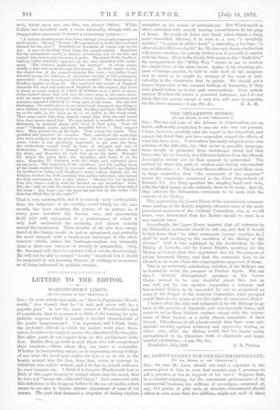LETTERS TO THE EDITOR.
WORD SWORTH' S LIMITS. [To TIM EDITOR. OF TRH SPECTATOR,1 SIR,—In your article last week, on "How to Popularize Words- worth," you remark that he "is not, and never will be, a popular poet." Is not the main reason of Wordsworth's lack of popularity, that he possessed so little of the longing for sym- pathetic response which is usually a decided characteristic of the poetic temperament ? You represent, and I think truly, the profound solitude in which his readers must place them- selves, in order to be ready to receive the stimulus of his thoughts. But other poets do not require from us this preliminary isola- tion. Rather they go forth to seek those who will comprehend their emotions,—those whom they can move to sympathy. Whether in interpreting nature, or in expressing strong feelings of any kind, the usual poet strikes his lyre so as to stir in. the hearts around him the love, hope, fear, scorn, or courage by which his own soul is swayed; and if he has no actual audience, he must imagine one. I think it is because Wordsworth had so little of this eager longing to compel others into his mood, that he does not "haunt the cultivated fancy." And connected with this deficiency is his frequent failure in the use of eimiles, which seems to me also to hinder intense enjoyment of some of his poems. The poet that demands a response of feeling employs metaphor as his means of enthralment. But Wordsworth is often contented with merely tracing resemblances by the play of fancy. He would sit down and think what objects a daisy most resembled, likening it in turn to a nun, "a sprightly maiden," "a queen. in rubies drest," a starveling, a Cyclops, "a. silver shield with boss of gold," &e, He does not choose similes that will arouse emotion ; he quietly invites you, if you will, to ramble with his fancy. Even in the lovely little poem to the" Daffodils," the comparison to the "Milky Way" seems to me to weaken. the simple force of the other verses. Again, in his touching pic- tures of human passion, he fails to seize hold of the imagina- tion as much as he might do, because of the want of indi- viduality in the characters that he paints. We should get a deeper impression of the common feelings of humanity, if they were placed before us in less pale surroundings. Over certain natures Wordsworth exerts a powerful influence, but I do not think that his poems, except a very few, will ever be popular, for the above reasons.—I am, Sir, Ste., E. A. M.


































 Previous page
Previous page